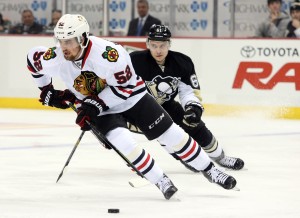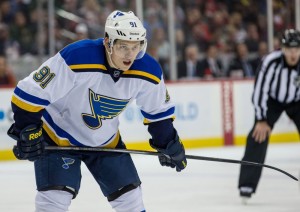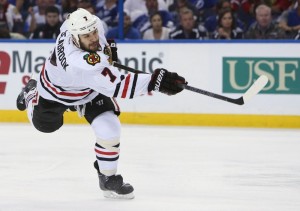Team depth had long been one of the biggest strengths of the Chicago Blackhawks when they won three Stanley Cups over just six seasons. And although last season’s group featured four primary defensemen and two rotators on the blue line, Duncan Keith, Brent Seabrook, Niklas Hjalmarsson, and Johnny Oduya made up one of the best top-4 cores in the NHL. This season, however, the team’s defensive group has been weaker than usual, and they could pay for that deficiency if not careful.
Lacking Depth
For example, Trevor van Riemsdyk and Erik Gustafsson have both struggled mightily in the first round against St. Louis. Despite the fact that each possesses a positive Corsi differential through the first five games, the duo combined for a -19 differential in just over 34 minutes at 5v5 on Thursday night.

Gustafsson seemed to struggle especially hard in game five. He failed to clear the defensive zone with possession of the puck for his team on back-to-back sequences in the third period, limiting his team’s time with the puck and making it difficult to counter the momentum of St. Louis.
And this game was perhaps the truest test of playoff hockey for the youngsters as Joel Quenneville quickly shortened his bench by sitting David Rundblad for extended periods of time. This likely won’t be the last time they are placed in high-pressure situations and asked to play more ice time. Quenneville has a history of letting players ride the bench if he doesn’t trust them, and Rundblad never seemed to earn Quenneville’s trust. It’s possible that Rundblad was only played to give veteran Michal Rozsival a rest, but it still seems likely that he will be back in the lineup at some point.
Viktor Svedberg is another option to play on the back-end, but it is unclear how the 6’8” Swede matches up against a St. Louis team that is quicker than in years past. With that in mind, it seems that it will be on TVR and Gustafsson to raise their play.
Struggling Staples
Another player that has struggled so far this postseason is Niklas Hjalmarsson. Normally a steadying presence for Quenneville on defense, Hjalmarsson has struggled to contain Vladimir Tarasenko in this series. In just over 39 minutes of 5v5 ice time against the Russian sniper, Hjalmarsson has a 39% CF, which is well behind his season mark of 51.8%.
Meanwhile, Tarsenko has had his way with the Blackhawks in posting three goals and five points through five games. The St. Louis winger has clearly transformed himself into an elite player in the NHL, but Hjalmarsson’s elite shutdown capabilities are supposed to counteract that.

These deficiencies are not what the Blackhawks have come to expect from themselves, but there are ways they can change the situation. Quenneville decided to load up with Patrick Kane and Jonathan Toews on his top line to spark his offense in game five, so would he consider doing the same with his defensive pairings entering game six at home?
Possible Solutions
Keith and Seabrook were longtime defensive partners at the start of their careers but have had to adjust to new pairings over the past few seasons. Still, the duo had a 60.24% CF rating when paired together this season, and their combination of grit and offense could be enough to keep the puck away from Tarasenko. Pairing those two together would leave Hjalmarsson without his normal partner in Keith, so he would probably have to be played with either TVR or Gustafsson.

While that may seem like a loss for ‘Hammer,’ he actually posted a better CF% (54.38 compared to 51.17) when paired with TVR than when he played with Keith this regular season. van Riemsdyk was also his second most popular partner during the regular campaign, suggesting that the adjustment wouldn’t be as rough on either party as some may think.
All told, a change in the defensive pairings ahead of game six may not be the answer to all of Chicago’s defensive problems, but any change at this point would probably be beneficial for this struggling unit.